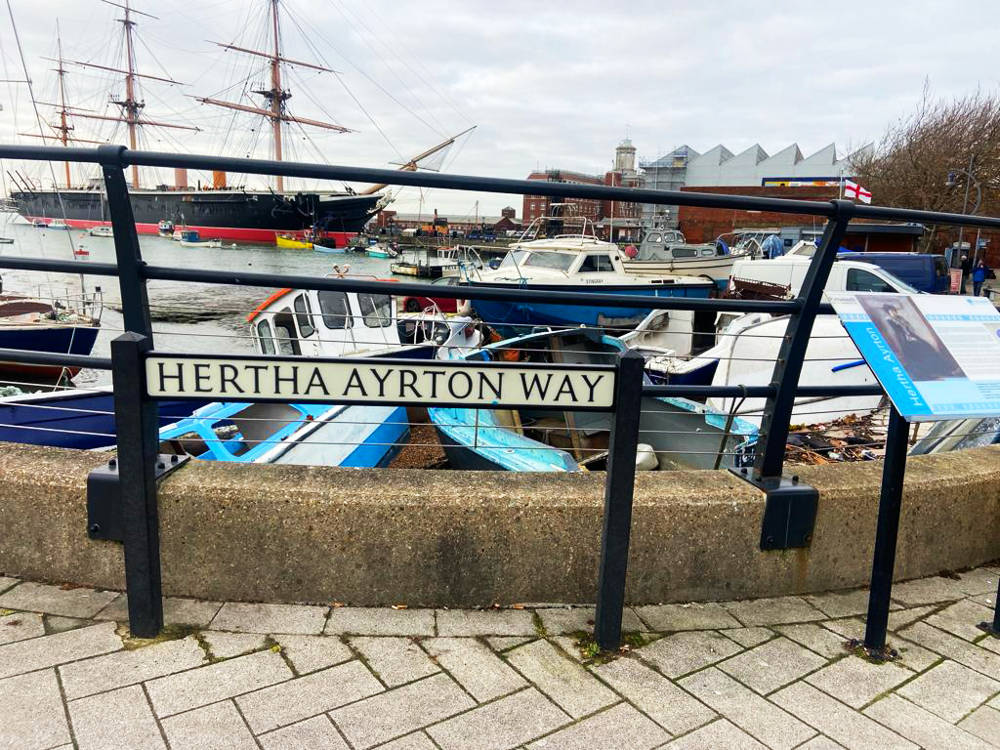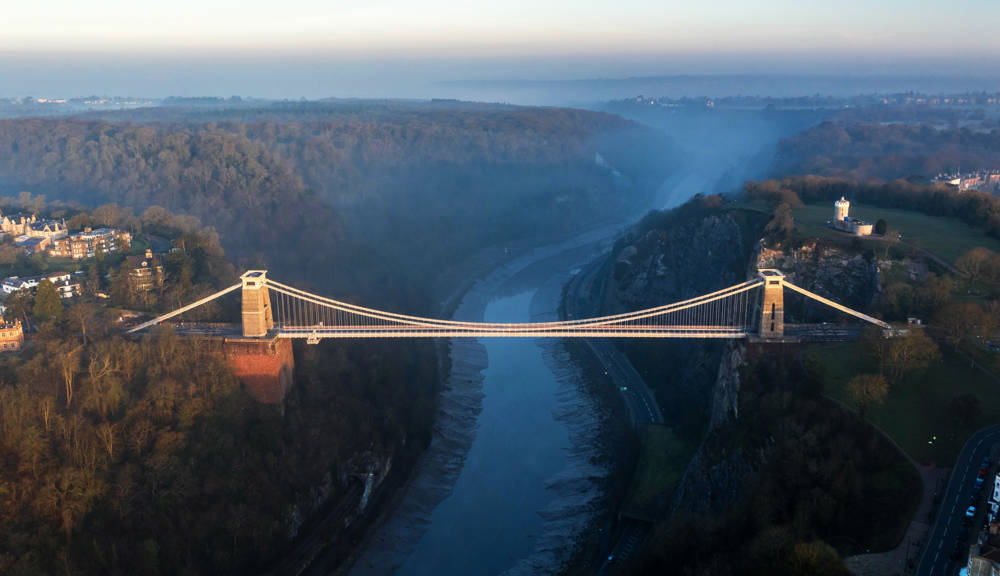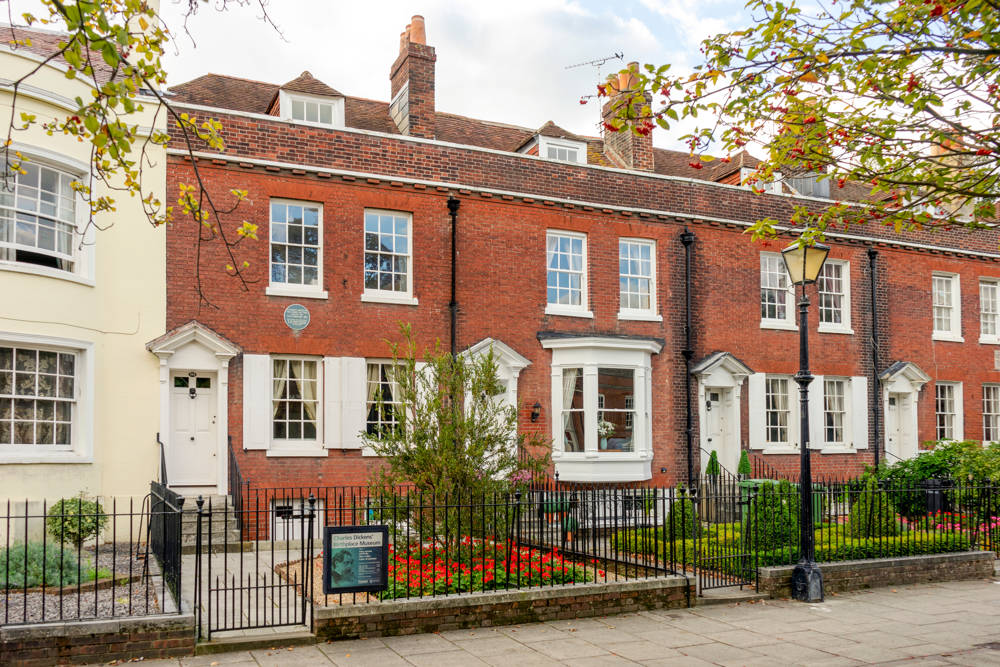Great things come from Portsmouth
Portsmouth is an exciting and vibrant hub of events, beautiful coastlines, rich naval history and home to some of the best attractions in the country, but what really sets us apart from the rest, is our brilliant people.
At City of Portsmouth College, we wanted to celebrate some of our top Portsmouthians – you can read about their incredible legacies below.
We asked you to either vote for one of these fabulous five, or submit your own suggestions, so we could rename our prominent Tower building at Highbury Campus and honour Portsmouth’s top hero.
Hundreds of you voted – and you chose pioneering scientist Hertha Ayrton as your Portsmouth Hero! Thank you all for taking part and celebrating the great things that come from Portsmouth.
Who has made our list so far?
Click to learn more about our selection of Portsmouth greats…


Hertha Ayrton
The woman who tamed lightning
Born in Portsea, one of the oldest districts of Portsmouth, on 28 April 1854, Phoebe Sarah Marks, or Hertha Ayrton as we know her today – was a pioneering woman of her time, who was fiercely determined to not let the gender discriminations of the Victorian era stand in her way of achieving greatness.
She proudly put her name to ground-breaking electrical engineering research and improvements to the common streetlamp, which we now heavily rely on in our daily lives, earning herself the label “the woman who tamed lightning”. Alongside these achievements, she proved herself over and over again with her brilliant mind and dedication, securing 26 mathematical and electrical engineering patents in her lifetime.
She also helped to pave the way for women to stand tall in a male dominated world as a dedicated suffragette, advocating for them to have their well-earned say, alongside key historical figures such as Marie Curie and Emmeline Pankhurst.
Learn more about Hertha Ayrton and how her genius changed Britain after dark.
Hertha Ayrton Way was named to celebrate her legacy, close to her Portsmouth birthplace.

Browse through our courses inspired by Hertha's amazing achievements

Isambard Kingdom Brunel
The man who built Britain
Born on Britain St, Portsmouth on 9th April 1806, Isambard Kingdom Brunel, named after his father, a French civil engineer, changed the way of life and the British landscapes far beyond recognition during the Industrial Revolution, mastering complex engineering challenges with precise and ingenious skill.
His accomplishments can be seen daily throughout Britain and he revolutionised the way we travel, from the Great Western Railway service, to ships, bridges and tunnels, even developing the world's longest commercial ship travelling from Bristol, UK to New York, USA, extending Britain's trade routes across the Atlantic. He was also the first to build a ship in sections, just like a bridge! His projects still cause many people to scratch their heads and wonder how they were built. He made the impossible possible.
Taught from a young age to draw, he believed that if he could draw it, he could build it. Paired with his early learnings of geometry and a naturally talented mind for numbers, physics and problem-solving, he proved that he could certainly build most things he turned his hands to.
Isambard’s most recognised projects include the impressive Clifton Suspension Bridge in Bristol, The Great Eastern Steam Ship and the Thames Tunnel in London.
Brunel didn't let anything stand in his way of creating engineering marvels, even the British countryside!
The Clifton Suspension Bridge which crosses the Avon Gorge in Bristol, was engineered by Brunel at just 26 years of age.

Explore the courses you could study to follow in Brunel's footsteps

Charles Dickens
The storyteller that captivated a nation
Charles John Huffam Dickens, born on 7 February 1812 in Landport, Portsmouth, has become a celebrated and world-famous name of the Victorian era. In recent times, not a Christmas goes by without a film adaptation of his great novels gracing our TV screens, so even if you haven’t read his books, you are probably familiar with his stories or characters - think Oliver Twist and Scrooge!
Growing up throughout the gritty period of the Industrial Revolution, Dickens left school at the age of 12 to work in a factory labelling bottles for 10+ hours a day, earning just 6 shillings a week. With appalling conditions and less than favourable working hours, he had it tough. These challenges began as his father was sent to a debtors' prison and Charles visited regularly. He spent much of his young life amongst unfavourable and eccentric characters, and then returned without the support of his family, to the horrible rat-infested conditions of his workplace.
His early years had a profound effect on his outlook on society and the way the poor, unfortunate and oppressed were treated, often by the governing classes. These experiences, along with his endless imagination later formed his short stories and novels with relatable protagonists, which he often based on real-life people from his past. His texts gave a platform to highlight the issues of the time and allowed the reader to feel connected to the struggles and life choices of the characters.
From a hard start in life to one of the most celebrated novelists of his time, Charles Dickens' talent to write captivating stories about uncomfortable topics, with comedy, wit and great storytelling, was something truly unique. We are proud that he began life in Portsmouth and has become one of our greats!
How did Dickens manage to entertain a nation in such challenging times?
The Charles Dickens Birthplace Museum is open to the public in Portsmouth, showcasing classic Victorian style alongside some of his prized possessions.

Explore your own creative genius with our selection of courses, inspired by Dickens himself

Mason Mount
The boy who had a dream
25-year-old Mason Tony Mount, was born in Portsmouth on 10 January 1999 to a football-familiar household. His dad, who coached local clubs, helped Mason to establish his football journey from the start. At the remarkably young age of 4, he was invited to train in the academies at Portsmouth and Chelsea, showcasing his natural abilities to the clubs’ talent scouts.
His passion and dedication for the sport was apparent on the field and Mason was selected for Chelsea’s prestigious academy aged just 6.
With his hardworking and tenacious playing style, he played for Chelsea’s under-18 team when he was 15 and then continued upwards to their under-21 team at 17 and lastly to their senior team at 18. Mason earned himself the title of Chelsea’s Player of the Year 2020/21 & 2021/22, has played for England, and has most recently signed to Manchester United.
Mason keeps firmly in touch with his Portsmouth roots, and speaks highly of his home clubs which set him on the path to success. He continues to inspire young talented footballers across the country to follow their dreams of playing professionally, and has rightfully earned his place on the list of Portsmouth greats!
Accompany Mason Mount back to his Portsmouth roots, where his football dreams began.
Have aspirations to play sport professionally? Browse through our sport courses and kick-start your career

Freda Swain
The classical music maestro
Freda Swain was born in Southsea, Portsmouth on 31 October 1902 into a musical family. Her father was said to be a musical instrument trader from Fawcett Road, Southsea, and was a supporter of her talents from the beginning. Her official training began early at age 11, when she attended the Tobias Matthay Piano School in London.
Often travelling alone to London for lessons by train, Freda gained her independence and confidence early and was described as a “strong” and fiercely determined person by many of her acquaintances. A woman who wasn’t afraid to go against the grain.
As Freda’s talents developed, she was awarded a scholarship by the Royal College of Music where she focussed on her composition training alongside her piano mastery. Throughout her life, Freda was gifted in all areas of music and enjoyed teaching, including as a professor at RCM where she had earlier studied, alongside performing and composing her own music, and that of others. She was passionate about promoting upcoming composers and artists, especially women composers, and founded the British Music Movement in 1936.
She continued to write music for many years, however, much of this remained unpublished and unheard. At the time of her passing in 1985, her catalogue included 450 pieces including opera, piano, original songs, violin and cello music, which were mostly created prior to 1960. Although Freda and her music didn't receive the recognition they deserved at the time, she has most certainly earned her place on our list of Portsmouth greats, for her outstanding contributions to classical music.
In a wonderful tribute, the Portsmouth Guildhall has a beautiful room named in her honour, The Freda Swain Lounge.







